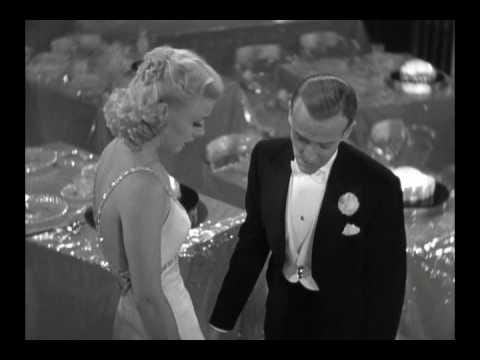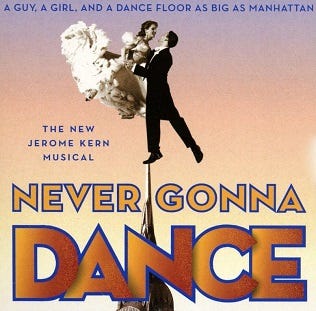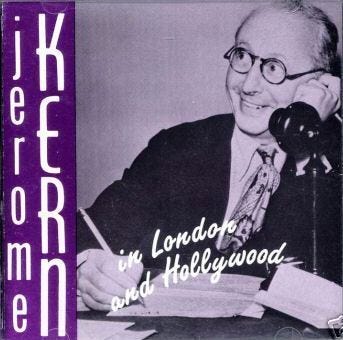I continue to acknowledge Sammy Cahn’s assertion that Irving Berlin “has written all the great songs about dancing.” But with Swing Time, the sixth movie to co-star Fred Astaire & Ginger Rogers, Jerome Kern and Dorothy Fields seemed determined to leave their mark on this very specific genre. They gave Astaire a song about the other greatest dancer in the world (“Bojangles of Harlem”), and they gave him a song about a guy who can’t dance at all, but at least is trying (“Pick Yourself Up”). Then, remarkably, they gave us a second great song about not wanting to dance at all.
It speaks to the popularity of “I Won’t Dance” in Roberta that the producers initially intended this 1936 reunion of Astaire and Rogers with Kern and Fields to be titled I Won’t Dance, and then, at some point, Never Gonna Dance. In the end, it seemed the idea of not dancing was a provocative enough title for a single number, but unwise to promote the notion that this would be a Fred & Ginger movie where nobody dances.
Directed by George Stevens, Swing Time is often cited as the high point of the series. The lyricist and composer wrote five great songs for the score, six if you include the instrumental “The Waltz in Swing Time.” “Never Gonna Dance” is the most stunning example of a musical number in the hands of a great director who, in this case, was hardly a specialist in musicals or song-and-dance; “Never Gonna Dance” is about acting even more than it is about singing or dancing.
Is the song “Never Gonna Dance” a sequel, or, possibly, a follow-up to “I Won’t Dance”? (Well, I always thought that “The Piccolino” and even “The Yam” were sequels to “The Continental.” Then there’s the “Hunkadola” in George White Scandals of 1935.) “I Won’t Dance” is an uptempo, major key number that, ironically enough, is absolutely perfect for dancing. “Never Gonna Dance” is delivered much more slowly. It starts ostensibly a sad torch song in a minor key, but quickly shifts to major, and is so peppered with self-mocking humor - especially in the form of topical references - that it’s much more funny than it is sad. (“One For My Baby,” written for Astaire by Johnny Mercer and Harold Arlen in The Sky’s the Limit, 1942, is a later example of a self-mocking torch song - or saloon song - in the great song-and-dance man’s canon.)
Where “I Won’t Dance” was expertly rewritten for Astaire, “Never Gonna Dance” was conceived from the ground up for him by Fields and Kern, and, in that respect, is even more finely-tuned and tailor-made for him. For all the romanticism of his major dance numbers, both solos and duets, he was reluctant to take himself too seriously, especially when Hollywood tried to build him up as a great lover or romantic figure. (In this he had much in common with his later costar, Bing Crosby.) “Never Gonna Dance” is both a torch song and a parody of one.
As pianist and singer Eric Comstock observes, “It’s a statement about all arts and all artists - the idea of giving it up is unthinkable unless something (one’s age or health) or someone (Penny) comes between you that makes it necessary to give it up.”
In Swing Time, Astaire plays “Lucky,” who, as we approach the climax of the story, has lost the love of his life, his great dancing partner, Rogers as “Penny.” Despondent, he vows that since he can’t dance with her, he’ll never dance again.
Though, I'm left without a Penny
The wolf was discreet, he left me my feet,
There are the first of the double meanings, when he says he’s “without a Penny,” he doesn’t necessarily mean that’s he’s broke, but he’s without Ginger, i.e. “Penny.” “The Wolf” is a reference to the great depression, and the slogan “keep the wolf from your door,” associated with President Roosevelt and the New Deal. Astaire and his sister Adele had already done a whole song about the wolf at the door titled “Sweet Music” in The Band Wagon (1931), with a line that goes, “sweet music will worry the wolf away.”
And so, I put them down on anything
But the la belle - la perfectly swell - romance
Never gonna dance
Never gonna dance
Only gonna love
Never gonna dance
I have to admit that I’ve always puzzled over this reference, which has already been hinted at in the dialogue, “la belle romance - la perfectly swell romance!” The phrase “la belle romance” is the sort of thing that either Europeans or faux-sophisticated Americans would toast to with French champagne. Putting one’s feet down on romance is apparently a play on that or a metaphor that I never quite get. However, the idea of sticking in the low class slang term “swell” is a great way to puncture that hoity-toity-ness, much as Rodgers & Hart did with “Thou Swell.”
Have I a heart that acts like a heart
Or is it a crazy drum
Beating the weird tattoos
Of the “St. Louis Blues?”
Here, the word “tattoo” is a now completely anachronistic reference to an exotic - and also often erotic - percussion pattern. (In the retro musical Dames at Sea, there’s a line about “The beguine - deep in my heart, it’s beating a wild tattoo.”) And “The St. Louis Blues,” though roughly 25 years old at this point, is still contemporary and funky - in fact, after Astaire sings that line, we hear the orchestra throw in a few bars of the opening line of the W. C. Handy classic.
Have I two eyes to see your two eyes
Or see myself on my toes
Dancing to radios
For Major Edward Bowes?
Everyone watching the movie would have been familiar with Major Bowes, who was the era’s chief organizer and promoter of amateur performers. Rather than trivialize him, as Fields does with “La perfectly swell romance,” the lyric aggrandizes him by giving us, very formally, his full name.
The song repeats at this point:
Though, I'm left without a penny
The wolf was discreet, he left me my feet
And so, I put them down on anything
But the la belle, la perfectly swell romance
Never gonna dance
Never gonna dance
Only gonna love
Never gonna dance
Then there’s some very whimsical punning which allows Astaire to further make fun of his “brand” - ie, his dancing shoes and the formal attire in which he usually performs:
I'll put my shoes on beautiful trees
I'll give my rhythm back to the breeze
My dinner clothes may dine where they please
For all I really want is you
The whimsy is similar to that of a Marx Brothers movie, and the lyric acknowledges this:
And to Groucho Marx, I give my cravat
To Harpo goes my shiny silk hat
The song gets serious again, if only momentarily:
And to heaven, I give a vow
To adore you, I'm starting now
To be much more positive
The way he sings that last word is a joy in itself, stretching it out while an upbeat major chord sounds behind him, “pos-i-tive…!” Thus it’s not really a torch song after all, if he is going to be, as he says, much more positive.
Though, I'm left without my penny
The wolf was not smart, he left me my heart.
And so, I cannot go for anything
But the la belle, la perfectly swell romance
Never gonna dance
Never gonna dance
Only gonna love you
Never gonna dance
We end with a summing up, a return to the two opening references, Penny and The Wolf.
“Never Gonna Dance” is an altogether much more ambitious piece of musical storytelling than “I Won’t Dance”; it’s much more about narrative and character. You could make the claim that it’s a step forward in the direction of modern musical theater, even if more modestly so than Kern’s Show Boat was. Because it’s so specific to the story and the performer, it’s much less widely performed and recorded than “I Won’t Dance” - neither Sinatra nor Ella Fitzgerald ever sang it - but there is a crackly good version by Bobby Short, in which Kern’s modern harmonies are delineated by vibraphones and exotic voices. The contemporary pianist-singer-scholar Eric Comstock frequently performs “Never Gonna Dance” in his shows at Birdland and elsewhere.
There also was a Broadway musical called Never Gonna Dance, which was a stage adaptation of Swing Time. Alas, it ran for only three months in the 2003-2004 season. Ultimately the story really needed Rogers and, especially, Astaire to make it work - he not only was the greatest dancer that ever lived, he was the greatest even when he was telling us that he didn’t want to dance at all.
Post Script:
WF: "I don’t know of any recording of the Hammerstein version” (of “I Won’t Dance”)
From our dear friend GEORGE CONNOLLY (who introduced me to Barbara Cook many years ago):
It was recorded by Andrea Marcovicci and David Staller for the 1992 album called JEROME KERN IN LONDON AND HOLLYWOOD. That was the first time I heard the original version. I gave the lyric to Barbara Cook and she and Wally Harper combined the versions and included it in their 1997 club act and album of Oscar Hammerstein songs. I had been urging her to do a show using Hammerstein's songs for a few years and I suggested the title of OSCAR WINNERS. I had intended for them to include "The Last Time I Saw Paris" so Hammerstein's two Oscar-winning songs would be there and the double meaning of the show/album title would make more sense. But they didn't do "The Last Time I Saw Paris." Oh, well....
(This was before THE COMPLETE LYRICS OF OSCAR HAMMERSTEIN was published in 2008.)
Very Special thanks to the fabulous Ms. Elizabeth Zimmer, for expert proofreading of this page, and scanning for typos, mistakes, and other assorted boo-boos!
Sing! Sing! Sing! : My tagline is, “Celebrating the great jazz - and jazz-adjacent - singers, as well as the composers, lyricists, arrangers, soloists, and sidemen, who help to make them great.”
A production of KSDS heard Saturdays at 10:00 AM Pacific; 1:00PM Eastern.
To listen to KSDS via the internet (current and recent shows are available for streaming.) click here.
The whole series is also listenable on Podbean.com, click here.
Wednesday, January 31
7:00PM (EST) - THE NEW YORK ADVENTURE CLUB presents:
Start Spreading the News!
'The Great New York Songbook: Music & Musicians Who Captured NYC' Webinar
click_here
SLOUCHING TOWARDS BIRDLAND is a subStack newsletter by Will Friedwald. The best way to support my work is with a paid subscription, for which I am asking either $5 a month or $50 per year. Thank you for considering. (Thanks as always to Beth Naji & Arlen Schumer for special graphics.) Word up, peace out, go forth and sin no more! (And always remember: “A man is born, but he’s no good no how, without a song.”)
Note to friends: a lot of you respond to my SubStack posts here directly to me via eMail. It’s actually a lot more beneficial to me if you go to the SubStack web page and put your responses down as a “comment.” This helps me “drive traffic” and all that other social media stuff. If you look a tiny bit down from this text, you will see three buttons, one of which is “comment.” Just hit that one, hey. Thanks!









‘Ultimately the story really needed Rogers and, especially, Astaire to make it work.” I’d say the *story* needed Rogers even more especially than Astaire. He fully deserves all praise for dancing and singing, but she carried the acting for both of them.